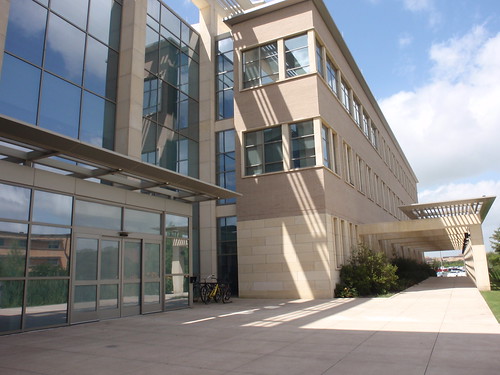 {Interdisciplinary Life Sciences Building at Texas A&M University}
{Interdisciplinary Life Sciences Building at Texas A&M University}
It’s June and undergraduate researchers are flocking to academic labs, eager to get started and maybe even—fingers crossed!—discover something new. Perhaps you are one of these bright-eyed, super smart college students. Good for you! In the lab, you’ll learn valuable things about yourself, whether you love the experience or not.
I’ve been working in research labs for ten years, starting as an undergrad myself. I went on to earn a PhD, and I’ve worked in three different labs after graduate school, two as a postdoc and one as a lab manager. I’ve been around the block a few times. I’ve seen many undergrads and first-year graduate students come and go. With all that in mind, I’d like to offer a few tips to help you get the most out of your summertime research experience.
* Be open to learning. Your primary task is to learn as much as you can. As a research student, you have the chance to learn by doing, which is invaluable. But you also have the chance to get critical feedback from your in-lab mentors and the professor in whose lab you are working.
* Take good notes on what you are doing. Oh my gosh, I cannot stress this enough. When you’re busy doing an experiment, you think you’ll remember what you did. And you might. But will you remember two months from now? Probably not. Do yourself (and your supervisor) a favor and WRITE IT DOWN. Write down what you did, what you observed, what you were thinking. Even your speculations are good lab notebook material. WRITE IT ALL DOWN!
* Take your time. This one is hard, I know. We live in a rush-rush-rush world. But science will bite you in the ass if you don’t let yourself slow down, think, and develop “good hands.” (“Good hands” is a phrase my friend Matt introduced to me, and it’s the idea of being able to execute your benchwork smoothly and easily. Think of all the muscle movements you must do to carry out an experiment at the bench, such as pipetting, pouring, mixing, injecting, and putting together your equipment. Good hands make your life much, much easier in the lab.)
* Be assertive but respectful. You should ask for what you need, absolutely. The social culture of the lab will play a role in when, how, and why people ask for things from each other. Try to avoid what I call “the lurker,” where you approach someone and stand there, waiting for them to acknowledge you when they are clearly at work on something. Instead, approach, say hello, and ask them if you can make a request. If they say yes, then go for it. If they say no, don’t take it personally, just come back at a later time.
Please understand that for long-time lab veterans, it can be hard to get anything done because of the number of interruptions during a day in the lab. Try to respect that they want to get their work done, just like you. Veterans have had to learn how to focus and say no amid the chaos of a busy lab, and sometimes they’ll say no to you, even if they really want to help you (just not right this moment).
* Eat some humble pie. “Don't be surprised at how often science doesn't work,” says my friend Tonya Shepherd, a PhD candidate in microbiology at Texas A&M University. Indeed, this is painfully common in science. Embrace your failures, learn from them, move forward with grace. Know that when you’ve failed, it also means that you tried something, and that counts for a lot.
* Organize, organize! This one might strike you as boring and anal-retentive, but having worked with the most organized PI ever last year, I can assure you that any organizational efforts you put forth will be rewarded tenfold. Label things well and make a database (like an Excel spreadsheet) for any sets you have or make. DNA extracts, primers, plasmids—these are all good examples of things that belong in a spreadsheet for future reference.
* Read. This advice comes from my friend Christopher Jagge, PhD, who manages the Amrein lab at the Texas A&M Health Science Center. When I asked him what one habit he’d advise young graduate students to cultivate, it was this: read. I’d add that it’s good for you to push yourself to read challenging publications from your field of study. The more you read, the better you will get at reading the hard stuff and actually remembering something from it.
* Go to lab meeting, dammit! If you’re doing research in a lab, even if it’s only a part-time thing, you should go to lab meeting. You’ll learn not only what everyone in the lab is doing, but you’ll learn a lot about how the lab thinks about science, their projects, troubleshooting, the state of their field, and so much more. Yes, I know, sometimes lab meeting is painfully boring—trust me, I’ve been there. But sometimes lab meeting is exciting and invigorating, a place where new ideas are born.
Ultimately, your research experience will be like many things in life: you get out of it what you put into it. In the words of my own undergraduate research advisor, Cliff Harris, PhD, of Albion College, “Immerse yourself. Read, think, ask, think about what you are about to do, ask, safely do, think about what you read and did, ask, write it all down all the time.”
Wise words from a chemistry professor who has had over a hundred undergraduate research students over the years.
Good luck and have fun!
No comments:
Post a Comment